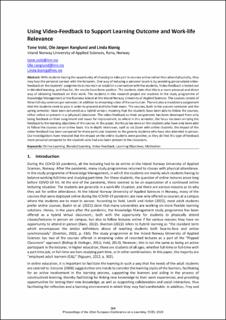Using video-feedback to support learning outcome and worklife relevance
Peer reviewed, Journal article
Published version
Permanent lenke
https://hdl.handle.net/11250/3122687Utgivelsesdato
2023Metadata
Vis full innførselSamlinger
Originalversjon
European Conference on e-Learning. 2023, 22 (1), 364-368. https://doi.org/10.34190/ecel.22.1.1802Sammendrag
With students having the opportunity of choosing to take part in courses online rather than attend physically, they may lose the personal contact with the lecturers. One way of inducing a personal touch is by providing personalized video-feedback on the students’ assignments to maintain or establish a connection with the students. Video-feedback is tested out in blended learning, and thus far, the results have been positive. The students claim that this is a more personal and direct way of obtaining feedback on their work. The students in this research project are students in the study programme of Knowledge Management at the Business School at the Inland Norway University of Applied Sciences. The courses consist of three full-day seminars per semester, in addition to streaming video of the curriculum. There is also a mandatory assignment that the students need to pass in order to proceed and take their exam. The courses, both in the autumn semester and the spring semester, have been delivered as a hybrid version, meaning that the students have been able to follow the courses, either online or present in a (physical) classroom. The video-feedback on their assignments has been developed from only being feedback on their assignment and issues for improvement, to where in this semester, the focus has been on tying the feedback to the learning objectives of the course. In this paper, the focus has been on the students who have only been able to follow the courses on an online basis. Via in-depth interviews, such as via Zoom with online students, the impact of the video-feedback has been compared for these particular students to the generic students who have also attended in person. Our investigations have revealed that the impact on the online students were positive, as they do find this type of feedback more personal compared to the students who had also been present in the classroom.
